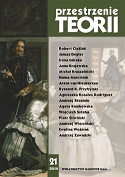„Francis Bacon czyli Diego Velázquez na fotelu dentystycznym” – malarskie i inne cytaty jako „dodatek” do rozpraszającego się życia
”Francis Bacon or Diego Velázquez in a dentist’s chair” – pictorial and other kinds of quotations as an addition to a disintegrating life
Author(s): Arent van NieukerkenSubject(s): Studies of Literature, Polish Literature, Theory of Literature
Published by: Uniwersytet Adama Mickiewicza
Keywords: Polish poetry; Tadeusz Różewicz; thematizing the impossibility; performative analysis;
Summary/Abstract: The mature poetry of Tadeusz Różewicz seems to be at odds with both modernist and postmodern literary tenets. It undeniably makes abundant use of intertextuality (including self-quotations), but in spite of this [post]modernist tendency it does resist self-referential impersonality. Różewicz again immerses allusions to images, texts and other artifacts – which, according to formalist and structuralist interpretations, should disengage themselves from an artist’s biography in order to achieve aesthetic autonomy – in the current of life, devoid of an innate sense and always identical to itself. In fact, life cannot be apprehended by art, and precisely, Różewicz tries to thematize this impossibility by producing texts or rather poetical acts that could be classified as self-effacing artifacts. He even succeeded in discrediting the modernist epiphany (which has a double status, i.e. as a poetical device and a window on the transcendent) by replacing it with loquacious anticlimaxes. The fragmentary, disintegrating form of his later poetry (the long poem “Francis Bacon or Diego Velázquez in a dentist’s chair” is a perfect – or rather consciously imperfect – implementation of this form) does not pretend to be a representation of a human being’s disintegrating existence. This poetry is, above all, an existential act, or – in other words – a performance, and not a self-sufficient work of art.
Journal: Przestrzenie Teorii
- Issue Year: 2014
- Issue No: 21
- Page Range: 59-76
- Page Count: 18
- Language: Polish

